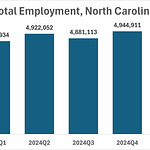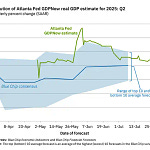DISCLAIMER: The opinions and comments expressed in this post/video and all posts/videos of the “Analyst Roundup” Substack only reflect those of the Author and do not reflect those of any other individual or party, especially the Author’s employer(s) or affiliations.
I know many of you who actually read and/or subscribe to this do follow politics. I also imagine you consider yourselves politically active, at least to the point of voting regularly on Election Day.
This election season hasn't been easy, and I'm ready for it to be over. Not only is it stressful and chaotic, the tone does nothing to help mitigate “writer's block.”
For whatever reason, I found enough keyboard energy to whip up two non-politically-oriented thoughts for social media this weekend. I share them below in hope they offer some constructive commentary on what each of this (me included) can do going forward in discussing, analyzing, and presenting policy solutions to our common public challenges:
Post 1 (From Sarurday, after Georgia beat Florida):
"Change" is not usually the problem. While some new ideas are not good, most make sense.
Typically, the problem is the pace of change, and that's where sensible leadership can help.
When it comes to change, it is the responsibility of leadership, regardless the institution, to mitigate its rate as much as possible so it can be absorbed, understood, and adapted to by those the leader serves (customers and/or citizens).
Note, the leader shouldn't resist facilitating change. Resistance is often a recipe for disaster.
Instead, the leader should evaluate and triage the change to assess the necessary pace by which those they lead and serve can effectively adapt. Sometimes, this rate of adaptation needs to be quicker than normal capacities. In those cases, the leader needs to exhibit sincere sympathy for the challenges faced with rapid adaptation.
Change is not easy, and gradual adaptation is ideal. Good leaders set realistic expectations and facilitate an environment where change is a supported given.
As much as possible, leaders should develop and uphold a culture of continuous reform and improvement, not destablizing transformation and revolution.
Good leaders enable effective change, and great leaders make appropriate change look easy and natural.
Post 2 (From Sunday, after NASCAR took more than 20 Minutes to rule on a Last Lap Move in Martinsville):
Ben Shapiro is correct: "Facts don't care about your feelings."
The problem isn't usually the facts. Instead, it's how they are presented.
It takes more than "facts" to win an argument, or convice others that your view is plausible, reasonable, or worth consideration.
Yes, lots of people encourage storytelling as the secret to success in articulating an idea or belief. There's nothing wrong with this, but it's not a skill everyone is born with, and it's not necessarily something one can develop.
Perhaps it's best to focus on tailoring your message to reflect a sincere respect for your audience. Your honest desire to help others needs to be heard and seen in how you communicate, not just the objective content of what you say.
There's also the importance of self-awareness as displayed by genuine humility. While we should do our best to know more about what we discuss and share from our place of constructive significance, we must believe and exhibit a presence where we never act like we know better.
Too often, good ideas are dismissed because their advocates allow their untempered confidence to lead into arrogance. At this point, their efforts are lost.
Self-awareness is a considerably more important skill to develop than storytelling when one wants to share and promote the facts embedded in truth.










